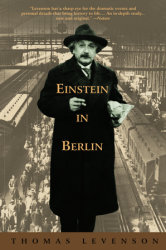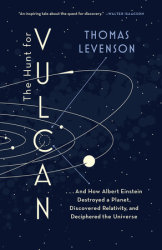Everyone knows the order of the planets: Vulcan, Mercury, Venus, Earth, Mars… Wait. Vulcan? Believe it or not, during the 19th century the astronomical community was absolutely convinced of the existence of a planet named Vulcan that orbited between our sun and Mercury. Their mathematical calculations insisted that it should be, as did the very order of the universe itself. The only problem was that Vulcan didn’t exist. In The Hunt for Vulcan, author Thomas Levenson shares the history of a planet that never was, and how it took the radical new theories of Albert Einstein to banish it from the sky.
PENGUIN RANDOM HOUSE: How did you hear about Vulcan? I’ve never heard of it in my life.
Thomas Levenson: I got the story in reverse of the way that you usually find such things. Twenty years ago, I was working on a couple of projects about Albert Einstein, and his single greatest accomplishment: the general theory of relativity. During my research, I discovered that as he was putting the final touches on his theory, he did a calculation showing that his new idea could accurately explain a tiny little anomaly in the orbit of Mercury. I didn’t know anything more than that.
It seemed to me like, of course, you’ve got a new theory, you run some calculations and you check it out, and if it passes those tests you feel good, but Einstein’s reaction to this was way out there. I mean, he told one friend that he had heart palpitations after he solved Mercury’s orbit correctly with his theory. He told someone else that he was beside himself with joy. It seemed like a huge reaction to something that at first glance was a minor step toward a new idea. I didn’t really think about it very much, but that mismatch of the emotional response to the action stuck with me.
Over the next few years while I was doing other things, I would return to what this problem with Mercury really was. It turned out that what Einstein had solved was a huge deal in the 19th century. The shining accomplishment of the mathematical astronomy and Newtonian science of the 19th century had been working out the details of the solar system and the discovery of Neptune, which was found by looking at perturbations in the orbit of Uranus.
When Mercury showed up with this really tiny error in its orbit that couldn’t be explained by anything else, the only possible response in light of this experience with Neptune was that there had to be another planet inside the orbit of Mercury. Very soon, this hypothetical planet was dubbed Vulcan. What really got me going was realizing that this proposed planet was reported to have been seen several times by reputable astronomers and accomplished amateur sky-gazers over a twenty year period. The idea that the planet should be present was so compelling that it made people see stuff that wasn’t there.
PRH: In the first part of the book you talk about the way that science is supposed to work versus the way it actually works. It’s something that intrigued me because you don’t hear scientists discuss this kind of problem. Can you talk about the difference between the two?
TL: We probably all heard at the high school science fair that the true test of science is the experiment or observation: You can have all of these great ideas, but until you test them in a rigorous way and get an answer that either agrees or disagrees with your idea, then you don’t know what you know. If the answer agrees with it, then you can go on and keep extending your ideas, but if it disagrees, it doesn’t matter how great the idea is: You have to give it up.
This picture of how science works as this kind of automatic extruder of knowledge—idea, test, compare answer to guess, rinse and repeat until you’re done—that’s the myth of science that scientists tell to themselves.
There’s an old cliche that a single brute fact can destroy a beautiful idea, but that assumes you can recognize what a brute fact means in the midst of all the things you already know. This turns out not to be true, because science is not like an automatic, mechanical extruder of knowledge churning out Hershey’s kisses from some production line or what have you: it’s a very difficult combination of ideas and really hard experimental work performed by fallible human beings who understand the world based on a framework that they already know and are comfortable with. When a fact comes along that doesn’t fit in the framework, it can be very hard to decide what it means because you don’t have a context for it.
The story of Vulcan was a great example of this. When the 19th century astronomical community came to the reluctant consensus that Vulcan didn’t exist despite being the best answer for the problem in the context what they knew, the myth of science would say that there’s something wrong with our idea and that we have to address it. Instead, mostly people just dropped it. Mercury had this little error and they didn’t know what it was or why it was there, but it was really tiny and the rest of the Newtonian system seemed to work just fine. There were other interesting things to think about, anyway: the discovery of x-rays and radiation, and all kinds of other great stuff.
This problem with Mercury just dropped out of sight until Einstein came along and solved it, but Einstein wasn’t developing a new theory of gravity because of a minor issue in understanding the solar system’s dynamic: He was doing it for theoretical reasons — logical ones. There was a conflict between his new special theory or relativity and Newton’s laws of motion that he wanted to resolve. He wanted to know how you could understand the universe in a relativistic way, and that meant everything in the universe. That’s what pushed him to develop a relativistic theory of gravity to replace Newton’s earlier version. The solution to the problem of Vulcan and Mercury dropped out of that effort, but it wasn’t the motivation for it.
To circle back to the question of how science works in reality versus how we’re told it works, the brute fact didn’t destroy Newton’s theory of gravity. The brute fact supplanted it only when the framework to understand it arrived as a feature of a relativistic universe. To boil it all down, you can’t understand some stuff until you have the tools to understand it with, and the tools in science are theoretical ideas, theoretical understanding, and world views. As long as you’re stuck in an old world view, facts that disagree with the old world view are annoying and they’re problematic, but they aren’t necessarily decisive, which is what we’re told they should be.
PRH: There were huge egos involved in the problem of Vulcan. You wrote that Urban Le Verrier, proponent of the Vulcan theory, was an “arrogant ass.”
TL: That’s pretty much the consensus view.
PRH: Would Vulcan have been as much of a problem had scientists not been dealing with someone who was not an arrogant ass?
TL: I think that personality is always involved. Science responds to reality and ultimately converges on better and better answers, but it is performed by scientists who put on their trousers one leg at a time, argue with their partners, and sometimes get up after too little sleep and are angry. Some scientists are arrogant as hell and some are models of collegial behavior, and everything in between. They’re people, right? I think that this would happen with a wide range of personality types, but it is certainly true that when you have a dominant, arrogant, powerful figure, it absolutely changes the way that scientific knowledge propagates through the immediate environment. It has an effect, but I’m not sure it’s a decisive effect.
PRH: He was a toxic boss.
TL: Absolutely. Le Verrier was not someone who was easy to love. He was, however, really, really good at the things he was good at.
PRH: You wrote that with Le Verrier’s reputation and the science behind the discovery of Neptune, the appearance of an object where it ought to be made sense; that It had a “moral right to be true.”
TL: Yes. You had a situation with Mercury where you had a really powerful theory and a very simple explanation: If there are perturbations in the orbit of Mercury that can’t be explained by what Venus or Jupiter is doing, then there should be something else there. It was perfectly good science, and the argument you would make and the first thing you would test. Given the powerful experience of finding Neptune exactly this way, the notion that you’d see the planet, this object that Le Verrier predicted should be there, was absolutely what you would expect.
It may have had a moral right to be there, but that didn’t mean that it actually was. Nature is far trickier than we are: It’s almost as simple as that.
Here’s another example: When people worked out the structure of DNA, there was an idea that we had of its structure and the way it codes for proteins and other things. There was this sense that we could read the DNA over time and learn how to make a human being or other living thing. Then came along the Human Genome Project, which read the whole genome. It turned out that the way the genome interacts with all of the stuff going on around it is much, much more complicated.
Our first assumptions about the way that living things ought to work were perfectly reasonable assumptions. We had a lot of data that fit our metaphors of how things should work, and when we found out it wasn’t that simple there was a lot of effort to understand it that is still going on.
If I can anthropomorphize, nature is enormously more complex and capable of generating things that our imaginations aren’t big enough to anticipate. It is like that all the way through science. One of the things I loved about the Vulcan story was that it was very clean and very simple: a very contained case study of this that generalizes beyond this one story and this one discipline of astronomy.
PRH: There were a lot of people who said they saw Vulcan. How often did people have an opportunity to look up and see that sort of thing? Did time constraints affect the search?
TL: That’s right. The problem with Vulcan is that these things have to come up at the edge of science; at the limit of what you can do. In the 19th century, there were only two ways to observe a small planet closer to the sun than Mercury.
The first was that if you had the right equipment and a special telescope you could possibly spot it in transit across the face of the sun. By graphing those transits, they could be timed with great precision, and once you knew what you were looking for, you could time precisely when and where it crossed the face of the sun and how long it took to travel across.
The second way to look for an object close to the sun in the 19th century was to look at the sun during a total eclipse: when the moon passes directly between our line of sight and blocks out the disc of the sun. That works really great, but the problem is that a duration of just four to four-and-a-half minutes is considered a very long eclipse. You wouldn’t have a lot of time to search the area around the sun for a nearby body, and that’s what people did in the 19th century: They watched for transits and used telescopes to scan the area nearby the sun during these brief moments of darkness. During a total eclipse, you’re looking very rapidly at multiple locations and have to confirm for yourself whether each dot of light is either a known star or an unknown object. You may have to have a star map, and if so, you have to know it really well. During the pressure, haste and just plain eeriness of an eclipse, it’s actually not that hard to make a mistake.
People found what they thought was Vulcan both ways. There was always the question of whether it was a planet or sunspot, but for various reasons both professional and amateur astronomers convinced themselves that what they were seeing was a planet.
PRH: Why was Einstein able to abandon Newtonian physics and charge into a new idea when people before him were reticent to do so? Was there anything about his personality that made him less hidebound than his predecessors?
TL: Einstein wasn’t just a little bit smarter than other physicists around him: He actually had qualities of personality and mind that allowed him to see the world in different ways from his colleagues, or at least to do so more easily. One of the things that Einstein was really good at was accepting things that were true but very difficult to accept. The roots of his genius was to take what he saw was clearly true and pursue the consequences of that commitment wherever they led him. Einstein wasn’t infallible, but noticing that he wasn’t perfect doesn’t change the fact that he was damned good.
The most stunning revelation of Einstein’s character is that when he finished general relativity and the calculations for Mercury came out right, he knew that he’d done it. The rest of the world needed more than that, and the eclipse expedition was this great test of his theory, but Einstein already knew that his ideas had force in the world. Mercury behaved as he thought it should for reasons that made sense in a radically new vision of reality, and that discovery alone created not just satisfaction, but joy, as the greatest works of art should do.
PRH: What can we take away from Vulcan’s story?
TL: We can tell the story of Vulcan — the people who got it wrong, who saw stuff that wasn’t there, or couldn’t figure out how to make sense of the fact that it wasn’t — from our perspective, and it’s always tempting to laugh at the past, to view ourselves as not just more knowledgeable, but somehow smarter, but the truth of the matter is that we’re not. We’re making the same kinds of mistakes now. We can look back now at these Victorian gentlemen committing acts of folly and self-deception and pat ourselves on the back for not being them, but a hundred years from now people will look back at what we think about any number of things, and wonder how we could have been so mistaken.
That’s the way humans beings make new knowledge: not by some direct route, but by trial and error, and day-by-day effort. Every now and then, our self-deception falls away and allows us to see something we’ve never seen before, and a genuine breakthrough happens.
















